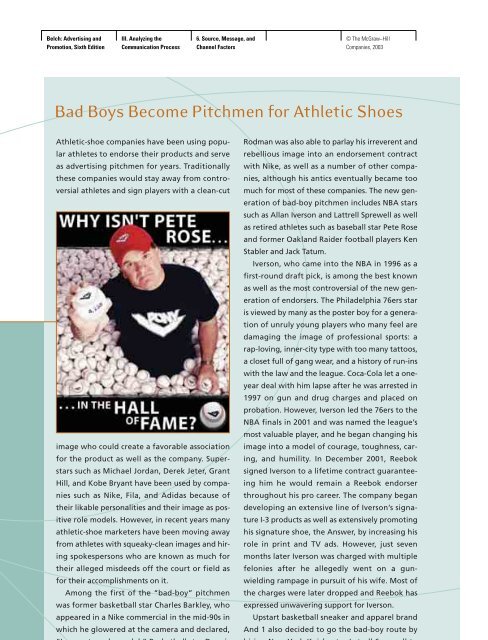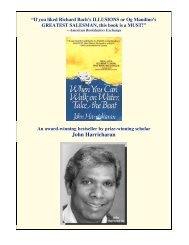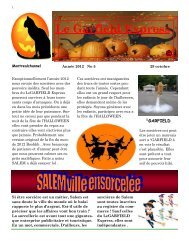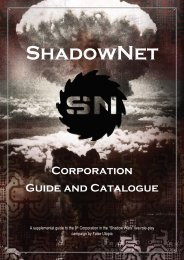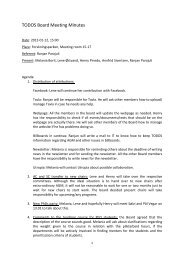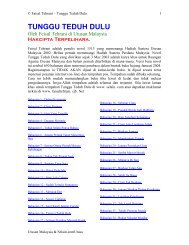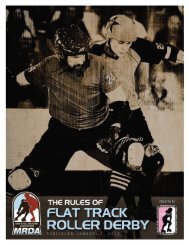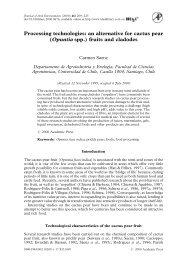- Page 2 and 3:
Belch: Advertising and Promotion, S
- Page 4 and 5:
Belch: Advertising and Promotion, S
- Page 6 and 7:
Belch: Advertising and Promotion, S
- Page 8 and 9:
Belch: Advertising and Promotion, S
- Page 10 and 11:
1 Part Five Developing the Integrat
- Page 12 and 13:
Belch: Advertising and Promotion, S
- Page 14 and 15:
Belch: Advertising and Promotion, S
- Page 16 and 17:
8 Part One Introduction to Integrat
- Page 18 and 19:
10 Part One Introduction to Integra
- Page 20 and 21:
12 Part One Introduction to Integra
- Page 22 and 23:
14 Part One Introduction to Integra
- Page 24 and 25:
16 Part One Introduction to Integra
- Page 26 and 27:
18 Part One Introduction to Integra
- Page 28 and 29:
20 Part One Introduction to Integra
- Page 30 and 31:
22 Part One Introduction to Integra
- Page 32 and 33:
24 Part One Introduction to Integra
- Page 34 and 35:
26 Part One Introduction to Integra
- Page 36 and 37:
28 Part One Introduction to Integra
- Page 38 and 39:
Belch: Advertising and Promotion, S
- Page 40 and 41:
32 Part One Introduction to Integra
- Page 42 and 43:
Belch: Advertising and Promotion, S
- Page 44 and 45:
Belch: Advertising and Promotion, S
- Page 46 and 47:
Belch: Advertising and Promotion, S
- Page 48 and 49:
Belch: Advertising and Promotion, S
- Page 50 and 51:
Belch: Advertising and Promotion, S
- Page 52 and 53:
Belch: Advertising and Promotion, S
- Page 54 and 55:
Belch: Advertising and Promotion, S
- Page 56 and 57:
Belch: Advertising and Promotion, S
- Page 58 and 59:
Belch: Advertising and Promotion, S
- Page 60 and 61:
Belch: Advertising and Promotion, S
- Page 62 and 63:
Belch: Advertising and Promotion, S
- Page 64 and 65:
Belch: Advertising and Promotion, S
- Page 66 and 67:
Belch: Advertising and Promotion, S
- Page 68 and 69:
Belch: Advertising and Promotion, S
- Page 70 and 71:
Belch: Advertising and Promotion, S
- Page 72 and 73:
Belch: Advertising and Promotion, S
- Page 74 and 75:
Belch: Advertising and Promotion, S
- Page 76 and 77:
Belch: Advertising and Promotion, S
- Page 78 and 79:
Belch: Advertising and Promotion, S
- Page 80 and 81:
Belch: Advertising and Promotion, S
- Page 82 and 83:
Belch: Advertising and Promotion, S
- Page 84 and 85:
Belch: Advertising and Promotion, S
- Page 86 and 87:
Belch: Advertising and Promotion, S
- Page 88 and 89:
Belch: Advertising and Promotion, S
- Page 90 and 91:
Belch: Advertising and Promotion, S
- Page 92 and 93:
Belch: Advertising and Promotion, S
- Page 94 and 95:
Belch: Advertising and Promotion, S
- Page 96 and 97:
Belch: Advertising and Promotion, S
- Page 98 and 99:
Belch: Advertising and Promotion, S
- Page 100 and 101:
Belch: Advertising and Promotion, S
- Page 102 and 103:
Belch: Advertising and Promotion, S
- Page 104 and 105:
Belch: Advertising and Promotion, S
- Page 106 and 107:
Belch: Advertising and Promotion, S
- Page 108 and 109:
Belch: Advertising and Promotion, S
- Page 110 and 111:
Belch: Advertising and Promotion, S
- Page 112 and 113:
Belch: Advertising and Promotion, S
- Page 114 and 115:
Belch: Advertising and Promotion, S
- Page 116 and 117:
Belch: Advertising and Promotion, S
- Page 118 and 119:
Belch: Advertising and Promotion, S
- Page 120 and 121: Belch: Advertising and Promotion, S
- Page 122 and 123: Belch: Advertising and Promotion, S
- Page 124 and 125: Belch: Advertising and Promotion, S
- Page 126 and 127: Belch: Advertising and Promotion, S
- Page 128 and 129: Belch: Advertising and Promotion, S
- Page 130 and 131: Belch: Advertising and Promotion, S
- Page 132 and 133: Belch: Advertising and Promotion, S
- Page 134 and 135: Belch: Advertising and Promotion, S
- Page 136 and 137: Belch: Advertising and Promotion, S
- Page 138 and 139: Belch: Advertising and Promotion, S
- Page 140 and 141: Belch: Advertising and Promotion, S
- Page 142 and 143: 1 Part Five Developing the Integrat
- Page 144 and 145: Belch: Advertising and Promotion, S
- Page 146 and 147: Belch: Advertising and Promotion, S
- Page 148 and 149: 142 Part Three Analyzing the Commun
- Page 150 and 151: Belch: Advertising and Promotion, S
- Page 152 and 153: 146 Part Three Analyzing the Commun
- Page 154 and 155: 148 Part Three Analyzing the Commun
- Page 156 and 157: 150 Part Three Analyzing the Commun
- Page 158 and 159: 152 Part Three Analyzing the Commun
- Page 160 and 161: 154 Part Three Analyzing the Commun
- Page 162 and 163: Belch: Advertising and Promotion, S
- Page 164 and 165: 158 Part Three Analyzing the Commun
- Page 166 and 167: 160 Part Three Analyzing the Commun
- Page 168 and 169: Belch: Advertising and Promotion, S
- Page 172 and 173: Belch: Advertising and Promotion, S
- Page 174 and 175: 168 Part Three Analyzing the Commun
- Page 176 and 177: Belch: Advertising and Promotion, S
- Page 178 and 179: 172 Part Three Analyzing the Commun
- Page 180 and 181: Belch: Advertising and Promotion, S
- Page 182 and 183: 176 Part Three Analyzing the Commun
- Page 184 and 185: Belch: Advertising and Promotion, S
- Page 186 and 187: 180 Part Three Analyzing the Commun
- Page 188 and 189: 182 Part Three Analyzing the Commun
- Page 190 and 191: 184 Part Three Analyzing the Commun
- Page 192 and 193: Belch: Advertising and Promotion, S
- Page 194 and 195: 188 Part Three Analyzing the Commun
- Page 196 and 197: Belch: Advertising and Promotion, S
- Page 198 and 199: 11 Part Five Developing the Integra
- Page 200 and 201: Belch: Advertising and Promotion, S
- Page 202 and 203: 196 Part Four Objectives and Budget
- Page 204 and 205: 198 Part Four Objectives and Budget
- Page 206 and 207: 200 Part Four Objectives and Budget
- Page 208 and 209: 202 Part Four Objectives and Budget
- Page 210 and 211: 204 Part Four Objectives and Budget
- Page 212 and 213: 206 Part Four Objectives and Budget
- Page 214 and 215: 208 Part Four Objectives and Budget
- Page 216 and 217: 210 Part Four Objectives and Budget
- Page 218 and 219: 212 Part Four Objectives and Budget
- Page 220 and 221:
214 Part Four Objectives and Budget
- Page 222 and 223:
216 Part Four Objectives and Budget
- Page 224 and 225:
218 Part Four Objectives and Budget
- Page 226 and 227:
220 Part Four Objectives and Budget
- Page 228 and 229:
222 Part Four Objectives and Budget
- Page 230 and 231:
224 Part Four Objectives and Budget
- Page 232 and 233:
226 Part Four Objectives and Budget
- Page 234 and 235:
228 Part Four Objectives and Budget
- Page 236 and 237:
230 Part Four Objectives and Budget
- Page 238 and 239:
Belch: Advertising and Promotion, S
- Page 240 and 241:
1 Part Five Developing the Integrat
- Page 242 and 243:
Belch: Advertising and Promotion, S
- Page 244 and 245:
238 Part Five Developing the Integr
- Page 246 and 247:
Belch: Advertising and Promotion, S
- Page 248 and 249:
242 Part Five Developing the Integr
- Page 250 and 251:
244 Part Five Developing the Integr
- Page 252 and 253:
246 Part Five Developing the Integr
- Page 254 and 255:
248 Part Five Developing the Integr
- Page 256 and 257:
250 Part Five Developing the Integr
- Page 258 and 259:
252 Part Five Developing the Integr
- Page 260 and 261:
254 Part Five Developing the Integr
- Page 262 and 263:
256 Part Five Developing the Integr
- Page 264 and 265:
258 Part Five Developing the Integr
- Page 266 and 267:
260 Part Five Developing the Integr
- Page 268 and 269:
Belch: Advertising and Promotion, S
- Page 270 and 271:
Belch: Advertising and Promotion, S
- Page 272 and 273:
Belch: Advertising and Promotion, S
- Page 274 and 275:
Belch: Advertising and Promotion, S
- Page 276 and 277:
Belch: Advertising and Promotion, S
- Page 278 and 279:
Belch: Advertising and Promotion, S
- Page 280 and 281:
Belch: Advertising and Promotion, S
- Page 282 and 283:
Belch: Advertising and Promotion, S
- Page 284 and 285:
Belch: Advertising and Promotion, S
- Page 286 and 287:
Belch: Advertising and Promotion, S
- Page 288 and 289:
Belch: Advertising and Promotion, S
- Page 290 and 291:
Belch: Advertising and Promotion, S
- Page 292 and 293:
Belch: Advertising and Promotion, S
- Page 294 and 295:
Belch: Advertising and Promotion, S
- Page 296 and 297:
Belch: Advertising and Promotion, S
- Page 298 and 299:
Belch: Advertising and Promotion, S
- Page 300 and 301:
Belch: Advertising and Promotion, S
- Page 302 and 303:
Belch: Advertising and Promotion, S
- Page 304 and 305:
Belch: Advertising and Promotion, S
- Page 306 and 307:
Belch: Advertising and Promotion, S
- Page 308 and 309:
Belch: Advertising and Promotion, S
- Page 310 and 311:
Belch: Advertising and Promotion, S
- Page 312 and 313:
Belch: Advertising and Promotion, S
- Page 314 and 315:
Belch: Advertising and Promotion, S
- Page 316 and 317:
Belch: Advertising and Promotion, S
- Page 318 and 319:
Belch: Advertising and Promotion, S
- Page 320 and 321:
Belch: Advertising and Promotion, S
- Page 322 and 323:
Belch: Advertising and Promotion, S
- Page 324 and 325:
Belch: Advertising and Promotion, S
- Page 326 and 327:
Belch: Advertising and Promotion, S
- Page 328 and 329:
Belch: Advertising and Promotion, S
- Page 330 and 331:
Belch: Advertising and Promotion, S
- Page 332 and 333:
Belch: Advertising and Promotion, S
- Page 334 and 335:
Belch: Advertising and Promotion, S
- Page 336 and 337:
Belch: Advertising and Promotion, S
- Page 338 and 339:
Belch: Advertising and Promotion, S
- Page 340 and 341:
Belch: Advertising and Promotion, S
- Page 342 and 343:
Belch: Advertising and Promotion, S
- Page 344 and 345:
Belch: Advertising and Promotion, S
- Page 346 and 347:
Belch: Advertising and Promotion, S
- Page 348 and 349:
Belch: Advertising and Promotion, S
- Page 350 and 351:
Belch: Advertising and Promotion, S
- Page 352 and 353:
Belch: Advertising and Promotion, S
- Page 354 and 355:
Belch: Advertising and Promotion, S
- Page 356 and 357:
Belch: Advertising and Promotion, S
- Page 358 and 359:
Belch: Advertising and Promotion, S
- Page 360 and 361:
Belch: Advertising and Promotion, S
- Page 362 and 363:
Belch: Advertising and Promotion, S
- Page 364 and 365:
Belch: Advertising and Promotion, S
- Page 366 and 367:
Belch: Advertising and Promotion, S
- Page 368 and 369:
Belch: Advertising and Promotion, S
- Page 370 and 371:
Belch: Advertising and Promotion, S
- Page 372 and 373:
Belch: Advertising and Promotion, S
- Page 374 and 375:
Belch: Advertising and Promotion, S
- Page 376 and 377:
Belch: Advertising and Promotion, S
- Page 378 and 379:
Belch: Advertising and Promotion, S
- Page 380 and 381:
Belch: Advertising and Promotion, S
- Page 382 and 383:
Belch: Advertising and Promotion, S
- Page 384 and 385:
Belch: Advertising and Promotion, S
- Page 386 and 387:
Belch: Advertising and Promotion, S
- Page 388 and 389:
Belch: Advertising and Promotion, S
- Page 390 and 391:
Belch: Advertising and Promotion, S
- Page 392 and 393:
Belch: Advertising and Promotion, S
- Page 394 and 395:
1 Part Five Developing the Integrat
- Page 396 and 397:
Belch: Advertising and Promotion, S
- Page 398 and 399:
394 Part Five Developing the Integr
- Page 400 and 401:
396 Part Five Developing the Integr
- Page 402 and 403:
398 Part Five Developing the Integr
- Page 404 and 405:
400 Part Five Developing the Integr
- Page 406 and 407:
402 Part Five Developing the Integr
- Page 408 and 409:
Belch: Advertising and Promotion, S
- Page 410 and 411:
406 Part Five Developing the Integr
- Page 412 and 413:
408 Part Five Developing the Integr
- Page 414 and 415:
Belch: Advertising and Promotion, S
- Page 416 and 417:
412 Part Five Developing the Integr
- Page 418 and 419:
414 Part Five Developing the Integr
- Page 420 and 421:
416 Part Five Developing the Integr
- Page 422 and 423:
418 Part Five Developing the Integr
- Page 424 and 425:
420 Part Five Developing the Integr
- Page 426 and 427:
422 Part Five Developing the Integr
- Page 428 and 429:
424 Part Five Developing the Integr
- Page 430 and 431:
426 Part Five Developing the Integr
- Page 432 and 433:
Belch: Advertising and Promotion, S
- Page 434 and 435:
1 Part Five Developing the Integrat
- Page 436 and 437:
Belch: Advertising and Promotion, S
- Page 438 and 439:
434 Part Five Developing the Integr
- Page 440 and 441:
436 Part Five Developing the Integr
- Page 442 and 443:
438 Part Five Developing the Integr
- Page 444 and 445:
440 Part Five Developing the Integr
- Page 446 and 447:
442 Part Five Developing the Integr
- Page 448 and 449:
444 Part Five Developing the Integr
- Page 450 and 451:
446 Part Five Developing the Integr
- Page 452 and 453:
448 Part Five Developing the Integr
- Page 454 and 455:
450 Part Five Developing the Integr
- Page 456 and 457:
Belch: Advertising and Promotion, S
- Page 458 and 459:
454 Part Five Developing the Integr
- Page 460 and 461:
456 Part Five Developing the Integr
- Page 462 and 463:
Belch: Advertising and Promotion, S
- Page 464 and 465:
1 Part Five Developing the Integrat
- Page 466 and 467:
Belch: Advertising and Promotion, S
- Page 468 and 469:
464 Part Five Developing the Integr
- Page 470 and 471:
Belch: Advertising and Promotion, S
- Page 472 and 473:
468 Part Five Developing the Integr
- Page 474 and 475:
Belch: Advertising and Promotion, S
- Page 476 and 477:
472 Part Five Developing the Integr
- Page 478 and 479:
474 Part Five Developing the Integr
- Page 480 and 481:
476 Part Five Developing the Integr
- Page 482 and 483:
478 Part Five Developing the Integr
- Page 484 and 485:
480 Part Five Developing the Integr
- Page 486 and 487:
Belch: Advertising and Promotion, S
- Page 488 and 489:
1 Part Five Developing the Integrat
- Page 490 and 491:
Belch: Advertising and Promotion, S
- Page 492 and 493:
488 Part Five Developing the Integr
- Page 494 and 495:
490 Part Five Developing the Integr
- Page 496 and 497:
492 Part Five Developing the Integr
- Page 498 and 499:
494 Part Five Developing the Integr
- Page 500 and 501:
496 Part Five Developing the Integr
- Page 502 and 503:
498 Part Five Developing the Integr
- Page 504 and 505:
500 Part Five Developing the Integr
- Page 506 and 507:
502 Part Five Developing the Integr
- Page 508 and 509:
504 Part Five Developing the Integr
- Page 510 and 511:
506 Part Five Developing the Integr
- Page 512 and 513:
508 Part Five Developing the Integr
- Page 514 and 515:
1 Part Five Developing the Integrat
- Page 516 and 517:
Belch: Advertising and Promotion, S
- Page 518 and 519:
514 Part Five Developing the Integr
- Page 520 and 521:
516 Part Five Developing the Integr
- Page 522 and 523:
Belch: Advertising and Promotion, S
- Page 524 and 525:
520 Part Five Developing the Integr
- Page 526 and 527:
522 Part Five Developing the Integr
- Page 528 and 529:
524 Part Five Developing the Integr
- Page 530 and 531:
526 Part Five Developing the Integr
- Page 532 and 533:
528 Part Five Developing the Integr
- Page 534 and 535:
530 Part Five Developing the Integr
- Page 536 and 537:
Belch: Advertising and Promotion, S
- Page 538 and 539:
534 Part Five Developing the Integr
- Page 540 and 541:
536 Part Five Developing the Integr
- Page 542 and 543:
538 Part Five Developing the Integr
- Page 544 and 545:
540 Part Five Developing the Integr
- Page 546 and 547:
542 Part Five Developing the Integr
- Page 548 and 549:
544 Part Five Developing the Integr
- Page 550 and 551:
546 Part Five Developing the Integr
- Page 552 and 553:
Belch: Advertising and Promotion, S
- Page 554 and 555:
550 Part Five Developing the Integr
- Page 556 and 557:
552 Part Five Developing the Integr
- Page 558 and 559:
554 Part Five Developing the Integr
- Page 560 and 561:
556 Part Five Developing the Integr
- Page 562 and 563:
558 Part Five Developing the Integr
- Page 564 and 565:
Belch: Advertising and Promotion, S
- Page 566 and 567:
Belch: Advertising and Promotion, S
- Page 568 and 569:
Belch: Advertising and Promotion, S
- Page 570 and 571:
Belch: Advertising and Promotion, S
- Page 572 and 573:
Belch: Advertising and Promotion, S
- Page 574 and 575:
Belch: Advertising and Promotion, S
- Page 576 and 577:
Belch: Advertising and Promotion, S
- Page 578 and 579:
Belch: Advertising and Promotion, S
- Page 580 and 581:
Belch: Advertising and Promotion, S
- Page 582 and 583:
Belch: Advertising and Promotion, S
- Page 584 and 585:
Belch: Advertising and Promotion, S
- Page 586 and 587:
Belch: Advertising and Promotion, S
- Page 588 and 589:
Belch: Advertising and Promotion, S
- Page 590 and 591:
Belch: Advertising and Promotion, S
- Page 592 and 593:
Belch: Advertising and Promotion, S
- Page 594 and 595:
Belch: Advertising and Promotion, S
- Page 596 and 597:
Belch: Advertising and Promotion, S
- Page 598 and 599:
1 Part Five Developing the Integrat
- Page 600 and 601:
Belch: Advertising and Promotion, S
- Page 602 and 603:
600 Part Five Developing the Integr
- Page 604 and 605:
602 Part Five Developing the Integr
- Page 606 and 607:
604 Part Five Developing the Integr
- Page 608 and 609:
606 Part Five Developing the Integr
- Page 610 and 611:
608 Part Five Developing the Integr
- Page 612 and 613:
610 Part Five Developing the Integr
- Page 614 and 615:
Belch: Advertising and Promotion, S
- Page 616 and 617:
614 Part Five Developing the Integr
- Page 618 and 619:
Belch: Advertising and Promotion, S
- Page 620 and 621:
1 Part Five Developing the Integrat
- Page 622 and 623:
620 Belch: Advertising and Promotio
- Page 624 and 625:
Belch: Advertising and Promotion, S
- Page 626 and 627:
624 Part Six Monitoring, Evaluation
- Page 628 and 629:
626 Part Six Monitoring, Evaluation
- Page 630 and 631:
628 Part Six Monitoring, Evaluation
- Page 632 and 633:
630 Part Six Monitoring, Evaluation
- Page 634 and 635:
632 Part Six Monitoring, Evaluation
- Page 636 and 637:
634 Part Six Monitoring, Evaluation
- Page 638 and 639:
636 Part Six Monitoring, Evaluation
- Page 640 and 641:
638 Part Six Monitoring, Evaluation
- Page 642 and 643:
640 Part Six Monitoring, Evaluation
- Page 644 and 645:
642 Part Six Monitoring, Evaluation
- Page 646 and 647:
644 Part Six Monitoring, Evaluation
- Page 648 and 649:
646 Part Six Monitoring, Evaluation
- Page 650 and 651:
648 Part Six Monitoring, Evaluation
- Page 652 and 653:
650 Part Six Monitoring, Evaluation
- Page 654 and 655:
652 Belch: Advertising and Promotio
- Page 656 and 657:
Belch: Advertising and Promotion, S
- Page 658 and 659:
Belch: Advertising and Promotion, S
- Page 660 and 661:
Belch: Advertising and Promotion, S
- Page 662 and 663:
Belch: Advertising and Promotion, S
- Page 664 and 665:
Belch: Advertising and Promotion, S
- Page 666 and 667:
Belch: Advertising and Promotion, S
- Page 668 and 669:
Belch: Advertising and Promotion, S
- Page 670 and 671:
Belch: Advertising and Promotion, S
- Page 672 and 673:
Belch: Advertising and Promotion, S
- Page 674 and 675:
Belch: Advertising and Promotion, S
- Page 676 and 677:
Belch: Advertising and Promotion, S
- Page 678 and 679:
Belch: Advertising and Promotion, S
- Page 680 and 681:
Belch: Advertising and Promotion, S
- Page 682 and 683:
Belch: Advertising and Promotion, S
- Page 684 and 685:
Belch: Advertising and Promotion, S
- Page 686 and 687:
Belch: Advertising and Promotion, S
- Page 688 and 689:
Belch: Advertising and Promotion, S
- Page 690 and 691:
Belch: Advertising and Promotion, S
- Page 692 and 693:
Belch: Advertising and Promotion, S
- Page 694 and 695:
Belch: Advertising and Promotion, S
- Page 696 and 697:
Belch: Advertising and Promotion, S
- Page 698 and 699:
Belch: Advertising and Promotion, S
- Page 700 and 701:
Belch: Advertising and Promotion, S
- Page 702 and 703:
Belch: Advertising and Promotion, S
- Page 704 and 705:
Belch: Advertising and Promotion, S
- Page 706 and 707:
Belch: Advertising and Promotion, S
- Page 708 and 709:
Belch: Advertising and Promotion, S
- Page 710 and 711:
Belch: Advertising and Promotion, S
- Page 712 and 713:
Belch: Advertising and Promotion, S
- Page 714 and 715:
Belch: Advertising and Promotion, S
- Page 716 and 717:
Belch: Advertising and Promotion, S
- Page 718 and 719:
Belch: Advertising and Promotion, S
- Page 720 and 721:
Belch: Advertising and Promotion, S
- Page 722 and 723:
Belch: Advertising and Promotion, S
- Page 724 and 725:
Belch: Advertising and Promotion, S
- Page 726 and 727:
Belch: Advertising and Promotion, S
- Page 728 and 729:
Belch: Advertising and Promotion, S
- Page 730 and 731:
Belch: Advertising and Promotion, S
- Page 732 and 733:
Belch: Advertising and Promotion, S
- Page 734 and 735:
Belch: Advertising and Promotion, S
- Page 736 and 737:
Belch: Advertising and Promotion, S
- Page 738 and 739:
Belch: Advertising and Promotion, S
- Page 740 and 741:
Belch: Advertising and Promotion, S
- Page 742 and 743:
Belch: Advertising and Promotion, S
- Page 744 and 745:
Belch: Advertising and Promotion, S
- Page 746 and 747:
Belch: Advertising and Promotion, S
- Page 748 and 749:
Belch: Advertising and Promotion, S
- Page 750 and 751:
Belch: Advertising and Promotion, S
- Page 752 and 753:
Belch: Advertising and Promotion, S
- Page 754 and 755:
Belch: Advertising and Promotion, S
- Page 756 and 757:
Belch: Advertising and Promotion, S
- Page 758 and 759:
Belch: Advertising and Promotion, S
- Page 760 and 761:
Belch: Advertising and Promotion, S
- Page 762 and 763:
Belch: Advertising and Promotion, S
- Page 764 and 765:
Belch: Advertising and Promotion, S
- Page 766 and 767:
Belch: Advertising and Promotion, S
- Page 768 and 769:
Belch: Advertising and Promotion, S
- Page 770 and 771:
Belch: Advertising and Promotion, S
- Page 772 and 773:
Belch: Advertising and Promotion, S
- Page 774 and 775:
Belch: Advertising and Promotion, S
- Page 776 and 777:
Belch: Advertising and Promotion, S
- Page 778 and 779:
Belch: Advertising and Promotion, S
- Page 780 and 781:
Belch: Advertising and Promotion, S
- Page 782 and 783:
Belch: Advertising and Promotion, S
- Page 784 and 785:
Belch: Advertising and Promotion, S
- Page 786 and 787:
Belch: Advertising and Promotion, S
- Page 788 and 789:
Belch: Advertising and Promotion, S
- Page 790 and 791:
Belch: Advertising and Promotion, S
- Page 792 and 793:
Belch: Advertising and Promotion, S
- Page 794 and 795:
Belch: Advertising and Promotion, S
- Page 796 and 797:
Belch: Advertising and Promotion, S
- Page 798 and 799:
IN2 Name and Company Index Belch: A
- Page 800 and 801:
IN4 Name and Company Index Belch: A
- Page 802 and 803:
IN6 Name and Company Index Belch: A
- Page 804 and 805:
IN8 Name and Company Index Belch: A
- Page 806 and 807:
IN10 Name and Company Index Belch:
- Page 808 and 809:
IN12 Name and Company Index Belch:
- Page 810 and 811:
IN14 Subject Index B Belch: Adverti
- Page 812 and 813:
IN16 Subject Index Belch: Advertisi
- Page 814 and 815:
IN18 Subject Index Belch: Advertisi
- Page 816 and 817:
IN20 Subject Index Belch: Advertisi
- Page 818 and 819:
IN22 Subject Index Belch: Advertisi


